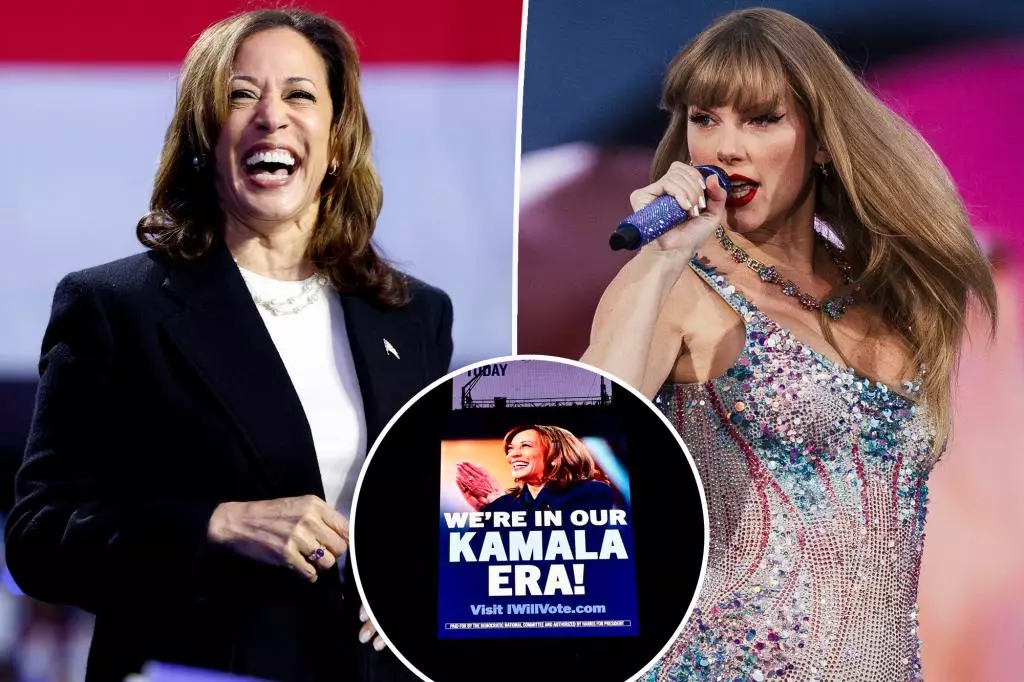In the era of social media and celebrity culture, endorsements by popular figures can significantly impact political campaigns. Recent events surrounding Vice President Kamala Harris and pop icon Taylor Swift epitomize this dynamic, highlighting the intersection of entertainment and politics. Harris’s campaign has adeptly seized upon Swift’s recent endorsement, which not only boosts visibility but also mobilizes voter engagement. As Swift’s influence permeates the political landscape, it raises essential questions regarding the role of celebrity in electoral processes and how political figures can navigate these relationships.
Swift, who maintained a relatively quiet stance on the upcoming election, made headlines when she publicly endorsed Harris and her running mate, Tim Walz. Her announcement, following a televised presidential debate, ignited a wave of enthusiasm among voters, demonstrated by over 400,000 new voter registrations within a single day. This stark uptick illustrates the potential of celebrity endorsements to galvanize public interest and participation in the democratic process, transforming apathetic individuals into motivated voters.
To capitalize on this momentum, the Harris-Walzel campaign unveiled a series of billboards in high-profile locations such as Times Square and the Las Vegas Strip, strategically employing Swift’s imagery and referencing her music. The phrases “We’re in our Kamala era” and “A New Way Forward… Ready for It?” not only align with Swift’s brand but also convey a message of hope and change that resonates with a diverse electorate. This approach not only bridges the gap between music and policy but also showcases the creativity of modern campaigns in engaging voters through culturally relevant messaging.
Swift’s words about Harris as a “steady-handed, gifted leader” contribute to the perception of Harris as a capable and reliable candidate, which is integral for voters seeking stability in tumultuous times. This portrayal becomes particularly important in today’s political climate, where emotions often run high and chaos can rhythmically alter public opinion.
The impact of Swift’s endorsement is further underscored by the response from political adversaries, particularly former President Donald Trump. Trump’s attempt to ride the wave of Swift’s popularity through the release of merchandise that mimics Swift’s tour attire embodies a trend where political figures seek to broaden their appeal by co-opting elements of popular culture. However, his simultaneously dismissive comments about Swift’s influence suggest a deeper, more personal pique at being overshadowed by a charismatic figure like Swift.
While Trump’s strategy of leveraging Swift’s fame highlights an attempt to connect with young voters, it also reveals a fundamental misunderstanding of the nuanced relationship between celebrity endorsements and political support. Swift’s endorsement symbolizes an alignment of values and vision that is not easily transferable; it cannot simply be commodified into merchandise without consideration for the underlying motivations that drive voter loyalty.
The events leading up to the 2024 presidential election indicate a growing trend where adolescent and young adult voters are significantly swayed by cultural icons. Swift’s powerful influence provides a roadmap for how strategically harnessed celebrity endorsements can spark critical issues—such as women’s rights and LGBTQ+ advocacy—into the spotlight during campaign seasons. As artists like Swift choose to speak out, their platforms can empower movements and drive policy discussions, demonstrating the power of artistic voices in political arenas.
Moreover, this intersection of pop culture and political mobilization gives rise to transformative voter engagement. The “Swiftie” community, with its enthusiastic support for their idol, transitions seamlessly into political activism, proving that fandom can extend beyond music and into civic responsibilities.
As we approach the 2024 election, the potent mix of celebrity influence and political ambition will likely continue to shape the landscape of voter participation. Harris’s campaign, with its innovative collaboration with Swift, underscores the need for candidates to embrace these cultural alliances thoughtfully, recognizing that the stakes are higher than mere visibility. In this modern political climate, capitalizing on the allure of celebrity is not merely an option; it has become a necessity for galvanizing voters who seek authenticity and alignment with their ideals. Thus, as this election unfolds, the true mettle of candidates may well be tested not only through their policies but also through the influencers with whom they align themselves.

